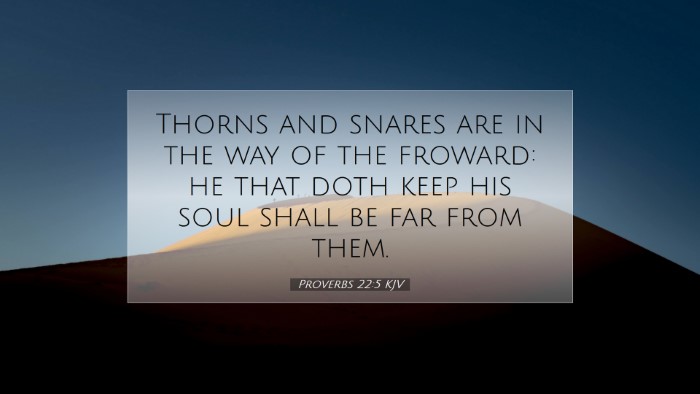Commentary on Proverbs 22:5
Proverbs 22:5 states, "Thorns and snares are in the way of the perverse; he who guards his soul will keep far from them." This verse serves as a poignant reflection on the consequences of moral choices, emphasizing the importance of wisdom and caution in our path of life.
Insights from Matthew Henry
Matthew Henry describes this verse as a cautionary reminder that the life of a fool or a perverse individual is fraught with danger. He emphasizes that those who choose to live in a manner contrary to God's law will inevitably find obstacles and hindrances that may lead to spiritual and moral ruin.
Henry highlights the metaphor of thorns and snares, explaining that these represent the painful and destructive consequences of sin. He notes that the 'perverse' refers to those who are crooked in their behavior and intentions, suggesting that intentional deviation from righteousness leads only to suffering.
Furthermore, Henry points out the imperative of guarding one's soul. To guard one's soul is to be vigilant against temptation and to pursue a path of righteousness. In doing so, one distances themselves from the dangers that come with poor choices.
Insights from Albert Barnes
Albert Barnes expands upon the imagery used in Proverbs 22:5 by illustrating the 'thorns and snares' as symbolic of deeper spiritual dangers that can entrap individuals. Barnes affirms that the way of the perverse is not just physically dangerous but also spiritually detrimental, as it leads people away from the truth and into darkness.
He notes that the term 'perverse' signifies not merely a general wrongdoing but a persistent and deliberate rebellion against God's commandments. In this context, Barnes asserts that wisdom involves understanding the pitfalls inherent in such conduct and actively avoiding them.
Additionally, Barnes stresses the necessity of self-vigilance, asserting that safeguarding one’s soul involves a commitment to righteousness and moral integrity. He advises that a wise individual is aware of the snares set by sin and the need for constant diligence to maintain spiritual health.
Insights from Adam Clarke
Adam Clarke approaches the verse with a focus on the broader implications of moral integrity and the psychological effects of transgression. Clarke remarks that 'thorns and snares' can be interpreted as not only physical obstacles but also mental and emotional turmoil that result from living in a morally compromised state.
Clarke interprets the warning against the perverse as a call to a robust internal moral compass that guides one through life's challenges. He argues that a person who is morally upright and guards their soul enjoys a tranquility of spirit that is absent from those who embrace a perverse lifestyle.
Moreover, Clarke emphasizes that the pursuit of wisdom is not merely academic but deeply practical, requiring application and a conscious effort to align one’s life with divine principles. He encourages readers to cultivate a habit of self-examination, to remain ever attentive to the potential pitfalls that exist along the path of righteousness.
Application for Pastors, Students, Theologians, and Bible Scholars
As pastors, students, theologians, and scholars delve into Proverbs 22:5, several key applications emerge:
-
Understanding Consequences:
Recognizing how moral choices shape not only personal experiences but also communal dynamics. The impact of living a perverse lifestyle extends beyond the self, affecting families, churches, and societies as a whole.
-
Encouraging Vigilance:
Promoting the importance of spiritual vigilance in a world full of distractions and temptations. Pastors can equip their congregations with strategies to guard their souls against these dangers.
-
Preaching Integrity:
Emphasizing integrity and wisdom in both personal and corporate moral decision-making. Biblical teaching should consistently highlight the virtues of righteousness and the wisdom that comes from adhering to God’s laws.
-
Fostering a Community of Accountability:
Encouraging a culture in churches and study groups where individuals feel supported in their struggles against sin and can hold one another accountable in their pursuit of holiness.
Conclusion
Proverbs 22:5 encapsulates the dual themes of peril and protection regarding moral living. Through the insights of notable commentators like Matthew Henry, Albert Barnes, and Adam Clarke, readers are reminded of the reality of consequences that accompany a perverse lifestyle while also being encouraged to actively guard their souls.
The path of wisdom, as delineated in this verse, calls for intentionality and vigilance, inviting pastors, students, theologians, and Bible scholars alike to reflect deeply on their responsibilities in teaching, learning, and embodying the principles of divine wisdom.


